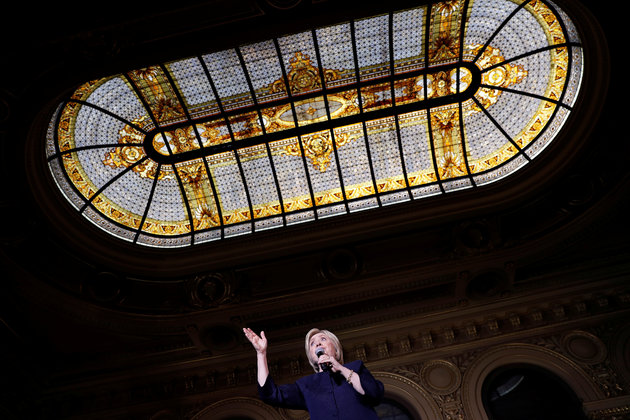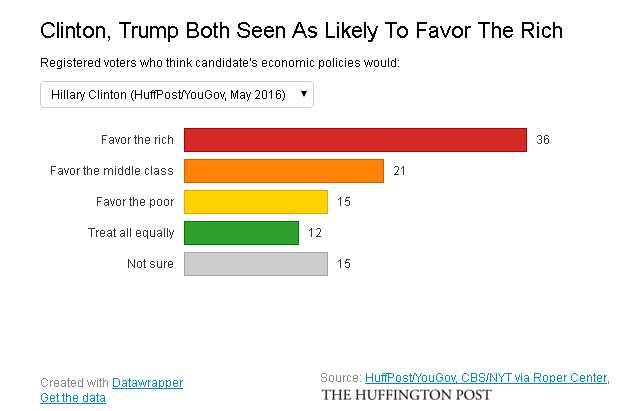
Four years ago, as President Barack Obama’s campaign staff geared up for a race against Mitt Romney, it made a decision to define the GOP nominee as a heartless, out-of-touch business mogul — “a protector of the privileged at the expense of the middle class,” as reporters Scott Wilson and Philip Rucker put it in 2012.
This year’s leading Democratic candidate, Hillary Clinton, has been testing out the same line of attack against her own businessman rival, Donald Trump. During a May rally in California, Clinton attacked Trump for welcoming the financial crisis as an opportunity to “make some money for himself.”
“He said, ‘I sort of hope that happens.’ He actually said that,” Clinton said, referring to the housing market crash. “And now he says he wants to roll back the financial regulations that we have imposed on Wall Street to let them run wild again. Well I will tell you what: You and I together, we’re not going to let him.”
But while Obama’s team was able to effectively paint Romney as a plutocrat, Clinton may struggle to draw an equally clear economic contrast between her and Trump. As a recent HuffPost/YouGov survey shows, both candidates are seen by a plurality of voters as likely to favor the wealthy.
Just under half of voters think Trump’s policies as president would favor the rich, while 16 percent believe they would favor the middle class, 2 percent think they would favor the poor and 20 percent think they would treat all groups equally. A smaller 36 percent plurality think Clinton’s economic policies would favor the rich, with 21 percent predict they would favor the middle class, 15 percent that they would favor the poor and 12 percent that they would treat all the classes about the same.
That’s significantly less daylight than voters perceived between Obama and Romney in the last presidential election. A 53 percent majority of voters thought Romney’s policies would favor the rich, while just 21 percent said the same of Obama’s, according to a July 2012 poll conducted by CBS and The New York Times.

Like Romney, Trump is seen as an ally of the rich. But Clinton has yet to establish herself as a convincing alternative.
And unlike Romney, Trump has nodded to a sort of populist economic message, arguing against free trade and issuing appeals to voters who feel left behind. He also gains cover from his willingness to take outright contradictory stands on policies like taxing the wealthy or raising the minimum wage, ideas he’s both espoused and opposed since declaring his candidacy last year. Seventy percent of Americans don’t know what he thinks on the minimum wage, or doubt he has a clear position, a recent survey found.
“Whereas Romney was a venture capitalist with an aloof, plutocratic manner who really did fervently support the Paul Ryan makers-versus-takers ideological vision of deep cuts to the safety net, Trump is posing as a kind of Man In The Street’s Billionaire,”The Washington Post’s Greg Sargent wrote in May, noting that focus groups had found voters unsure of his stance on the economy.
Economic issues, as in past election cycles, are at the top of voters’ minds this year. A fervor for economic populism is also present, with deep worries about the current state of affairs spanning party lines. Fewer than a third of voters believe that the country’s economic system is generally fair, with the rest saying it unfairly favors powerful interests. Most also say that corporations make too much profit, that jobs in their community are difficult to find and that national economic conditions are either fair or poor.
But neither candidate yet has a clear lead on economic issues. In the HuffPost/YouGov survey, voters are evenly split as to whether Clinton or Trump better understands the economic problems people in this country are having.
Few voters think either politician is likely to improve their own financial situations. Just a quarter think Trump’s policies would help them personally, while 36 percent believe the policies would hurt them. Clinton fares even worse on this measure, with only 16 percent of voters saying they’d personally benefit if she’s elected, and 45 percent that they’d be negatively affected.


